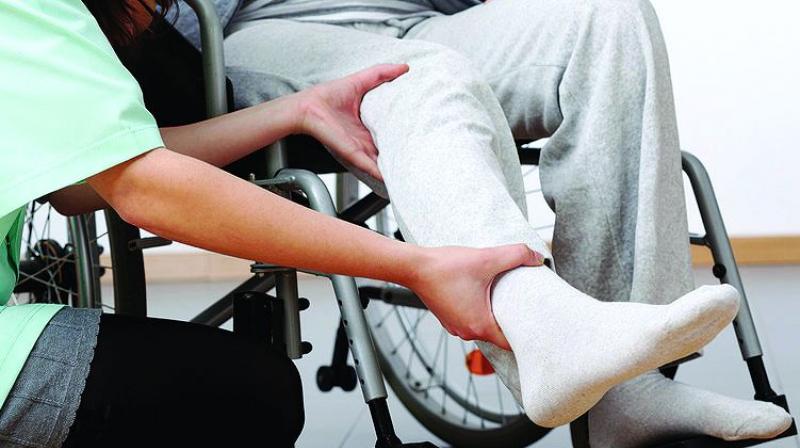Study: Stroke patients' rehab by family proves ineffective
Trials were done in 14 different locations in India.

Hyderabad: Caregivers of persons who have suffered a stroke have to be trained, but according to a study published in the noted international medical journal Lancet, even trained family members proved to be ineffective caretakers of the patients at home.
The Indian Institute of Public Health in Hyderabad which participated in the study where 1,250 patients were followed up for six months, observed that home- based care by family members didn’t bring out the expected improvement in the patients.
Professor G.V. Murthy of the Indian Institute of Public Health explained, “The family members were trained in the hospital and there was additional support provided by home visits to check if they were following the programme properly. The support system was extended to them as well but the outcome was not as desired.”
The trial was conducted in 14 centres in different locations in India.
But the results showed that maximum patients have not benefited from the home-based rehabilitation treatment provided to them by family members. This raised serious questions about the benefit of rehabilitation carried out by family members.
Similar programmes were carried out in high resource groups in other countries and the results there have shown that family-based care helped patients to recover.
Dr L. Richard who chaired the research explained, “Quality care was given by the family members and the patients received it properly. But in India, the follow-up visits at home did not show the degree of recovery or improvement in the quality of life as expected. This is a matter of concern as in middle and low income group, burdening the families with the cost of professional caregivers will increase the healthcare costs.”
Community health care programmes are being insisted upon by the World Health Organisation as it will train families and help them deal with the economic costs of care.
The negative results in India are making the neurologists worry about the rehabilitation factor.
Dr Deepika Sirineni, consultant neurologist
explained, “Maximum stroke patients are not able to recover as timely physiotherapy and occupational therapy are not provided to them.
“The acute phase of stroke is the first one week. When it is over, physiotherapy has to be provided so that the process of recovery begins.
But family members are not prepared to handle physiotherapy at home due to which majority of patients fail to recover at home.”
This shows that there is a need to identify the right family members who are willing to undergo proper training and learn the correct methods of physiotherapy so that the patient recovers.
Need for more stroke rehabilitation centres
An estimated 1.6 million people in India suffer from stroke every year and fatality is reported in 27 to 41 per cent cases. Stroke is the third most common cause of death in the adult population in the country. Lack of awareness is the first failure.
Delay in identifying the problem in the patient causes deterioration in their health condition.
It is estimated that 5,00,000 stroke-affected people are added every year to the number of patients who are living with stroke disability due to no proper rehabilitation programme.
In rural India, the situation is worse because of lack of training or because it is not feasible to allocate a caregiver to the patient. But this has not been documented wholly and therefore is also based on sample studies.
There are only 35 centres for stroke rehabilitation in the country and these are situated in the city areas.
Dr Radha Krishna, senior neurologist explained, “A stroke patient requires therapy at all levels. Hence physiotherapy is the first step towards regaining their physical ability. After that speech therapy is also required to help them communicate.”

